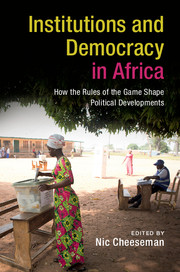Book contents
- Frontmatter
- Dedication
- Contents
- List of Figures
- List of Tables
- List of Contributors
- 1 Introduction: Understanding African Politics: Bringing the State Back In
- Part I Institutional Foundations
- 2 Institutional Legacies: Understanding Multiparty Politics in Historical Perspective
- 3 Property and Land Institutions: Origins, Variations and Political Effects
- 4 Financial Institutions: Economic Liberalisation, Credit and Opposition Party Successes
- Part II Law and Order
- Part III Elections, Parties and Political Competition
- Part IV Countervailing Institutions
- Index
- References
2 - Institutional Legacies: Understanding Multiparty Politics in Historical Perspective
from Part I - Institutional Foundations
Published online by Cambridge University Press: 05 February 2018
- Frontmatter
- Dedication
- Contents
- List of Figures
- List of Tables
- List of Contributors
- 1 Introduction: Understanding African Politics: Bringing the State Back In
- Part I Institutional Foundations
- 2 Institutional Legacies: Understanding Multiparty Politics in Historical Perspective
- 3 Property and Land Institutions: Origins, Variations and Political Effects
- 4 Financial Institutions: Economic Liberalisation, Credit and Opposition Party Successes
- Part II Law and Order
- Part III Elections, Parties and Political Competition
- Part IV Countervailing Institutions
- Index
- References
Summary
The institutions of multiparty politics in Africa today have important causal implications for a variety of critical outcomes, such as the ability to build cross-ethnic coalitions; the stability or volatility, accountability and representativeness of elections; the extent and distribution of public services; the likelihood of authoritarian successor parties’ return to power; the durability of democracy itself; and even the very existence and salience of particular social cleavages. These contemporary formal institutions have, in some cases, been crafted de nouveau from upheaval and transition moments, but in other cases have evolved gradually out of pre-existing authoritarian-era institutions. However, even where new institutions have been crafted in the recent past from scratch, this has not occurred in a vacuum. The legacies of past struggles – modes of organisation and distribution of power and resources – have a significant influence on the possibilities for the future.
This chapter demonstrates the significance of past institutional configurations – harking back to the era of supposed ‘institutionless’ politics in Africa, or the reign of the informal – in shaping contemporary multiparty politics. In doing so, it makes two corrections to existing interpretations of the political landscape. First, it is common to assert that African political parties are weak, with the assumption that parties do not structure the electoral playing field. This is an error that has serious consequences for understanding contemporary politics. Political parties across the continent vary dramatically not only in their strength, but also in the forms of territorial organisation, resources and strategies of mobilisation, internal rotation mechanisms and abilities to thrive beyond a single candidate or term in power. This variation is a global phenomenon, and understanding how parties structure the political playing field (and to what extent) is an empirical question relevant in Africa just as it is in Europe, Latin America, Asia and beyond.
First, it is important to highlight the many robust political parties in Africa – including the Chama Cha Mapinduzi (CCM) in Tanzania, the African National Congress (ANC) in South Africa, the National Democratic Congress (NDC) and New Patriotic Party (NPP) in Ghana, and the Mozambique Liberation Front (Frelimo) in Mozambique. They have historically distinct roots – from nationalist parties fighting for independence to revolutionary, military or multiparty opposition parties. These divergent origins offer particular opportunities for citizen-linkage strategies and power contestation, and also constrain other opportunities for adaptation and regeneration in a changing environment.
- Type
- Chapter
- Information
- Institutions and Democracy in AfricaHow the Rules of the Game Shape Political Developments, pp. 41 - 60Publisher: Cambridge University PressPrint publication year: 2018
References
- 2
- Cited by

